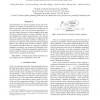1564 search results - page 240 / 313 » Performance Tuning of Iterative Algorithms in Signal Process... |
127
click to vote
ICASSP
2011
IEEE
14 years 6 months ago
2011
IEEE
Dynamic noise adaptation (DNA) [1, 2] is a model-based technique for improving automatic speech recognition (ASR) performance in noise. DNA has shown promise on artificially mixe...
105
Voted
ICASSP
2011
IEEE
14 years 6 months ago
2011
IEEE
In this paper we first introduce four kinds of modification of Symmetric Scoring [1] which produce likelihood ratios that do not need to be explicitly normalized, i.e. T-norm, Z...
129
Voted
ICASSP
2011
IEEE
14 years 6 months ago
2011
IEEE
The recently developed i-vector framework for speaker recognition has set a new performance standard in the research field. An i-vector is a compact representation of a speaker u...
119
Voted
ICASSP
2011
IEEE
14 years 6 months ago
2011
IEEE
This paper introduces a method of enhancing an unattended ground sensor (UGS) system’s classification capability of humans via seismic signatures while subsequently discriminati...
129
Voted
ICASSP
2011
IEEE
14 years 6 months ago
2011
IEEE
The performance of a speech recognition system may be degraded even without any background noise because of the linear or non-linear distortions incurred by recording devices or r...

